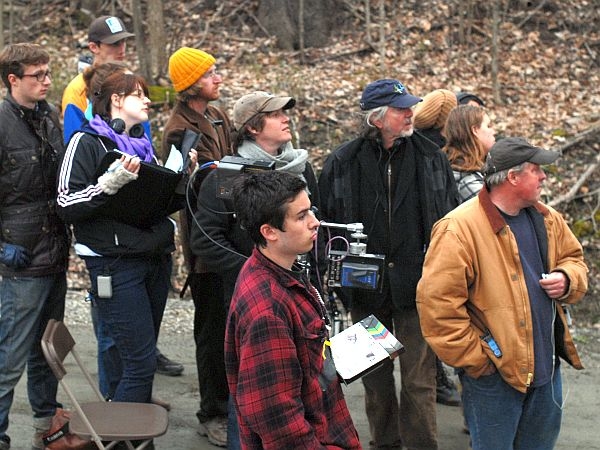
Young filmmakers on professional film sets usually end up doing the grunt work. But thanks to a collaboration between Marlboro College and Kingdom County Productions, dozens of college students and recent grads are getting the chance to step into more sophisticated roles and work side by side with industry veterans on the film, "Northern Borders."
In visiting the set, one realizes it doesn’t take much to make Marlboro’s historic town hall look like an old courtroom. The place is basically trapped in time – wide wooden benches, a faded American flag hanging on the wall
What does take work is turning the space into a film set. Reily Mumpton is Marlboro College first-year student working on a lighting setup for a courtroom scene. "We have a number of 1.2K lights, "says Mumpton. "They’re the biggest lights we have on set with us."
Mumpton is part of an intensive film course with a two-part mission: make a feature film, and educate budding filmmakers. The project has brought together college students from around New England, recent grads, and seasoned professionals. Today everyone’s moving so quickly, and with such purpose, that it’s hard to tell who’s who.
Vermont filmmaker Jay Craven is the lead educator and the director of Northern Borders. "In this scene, Abiah Kittredge, played by Genvieve Bujold, is challenging her husband’s desire to bring electricity to the farm," says Craven. "This is 1950’s Vermont. Some towns, some rural areas outside of towns especially, did not get electricity until late in the game." Northern Borders is based on the novel by Howard Frank Mosher. It’s the story of a young city boy who’s sent to live with his grandparents in the Northeast Kingdom. It’s 1956, and the boy enters a world set apart.
With a Vermont story, a Vermont-based crew and several local extras, Craven says the project models a new kind of filmmaking: "It’s making possible something that serves the region, which is place-based, indigenous cinema. Telling our stories." Craven says it’s a concept that he hopes his students absorb. "Think about making movies that are connected to place – that it’s not all about having to go to L.A. or New York."
Oscar nominee Bruce Dern from Pasadena, California, plays a lead role in the film. "Someday you oughta pull up a thing and look [to see] how many movies have actually been made in Vermont," Dern says. "I know there’s only eighteen movie theaters in Vermont. Eighteen!"
Anna Pinchuk is a Wellesley College junior and the film’s script supervisor. Her job is several rungs up on the film crew’s ladder. "I didn’t even know about the role or that it existed, "Pinchuk says of her job monitoring actors’ lines for continuity. "But it seemed like a great place to really learn and be close to the action."
Director of Photography Brad Heck is one of the professionals guiding students through the process "To find a place where people can both be learning and we can walk out with a feature film is something we’ve struggled with, but I feel in a lot of ways we’ve succeeded," says the Marlboro grad. "Frankly, the success has been because of the students and not because of the teachers."
As if teaching while filming weren’t enough, Jay Craven is also doing everything on a budget. He calls this "sustainable" filmmaking: The idea here was not to make a pretend film; it was to make a real film. And to do so on a budget that, frankly, is a quarter of what I’ve normally spent." The film’s budget is $500,000. While Craven is still raising money, he says he’s seen an incredible outpouring of donations and support from people excited about the project. He calls this a "barn raising."
"People that just live here that have been friends of Jay, friends of mine, friends of Marlboro College, are literally giving us everything for nothing," says producer Katherine Partington, another Marlboro grad. "Just for the spirit of the project. And that’s really unusual." Sugar shacks, historic inns — these are locations and sets that Hollywood would have to pay for. Then again, it also probably helps the bottom line that instead of getting paid, half the crew is just getting college credit.
Northern Borders will screen in a 100-town barnstorming tour when the film is completed. The project is made possible with support from Cabot Creamery, The Brattleboro Museum, Burlington City Arts, and many others.